Most Famous Presidential Debates in History
Want to know which presidential debates had the most heat? These are the most famous presidential debates that are still recalled to this day.
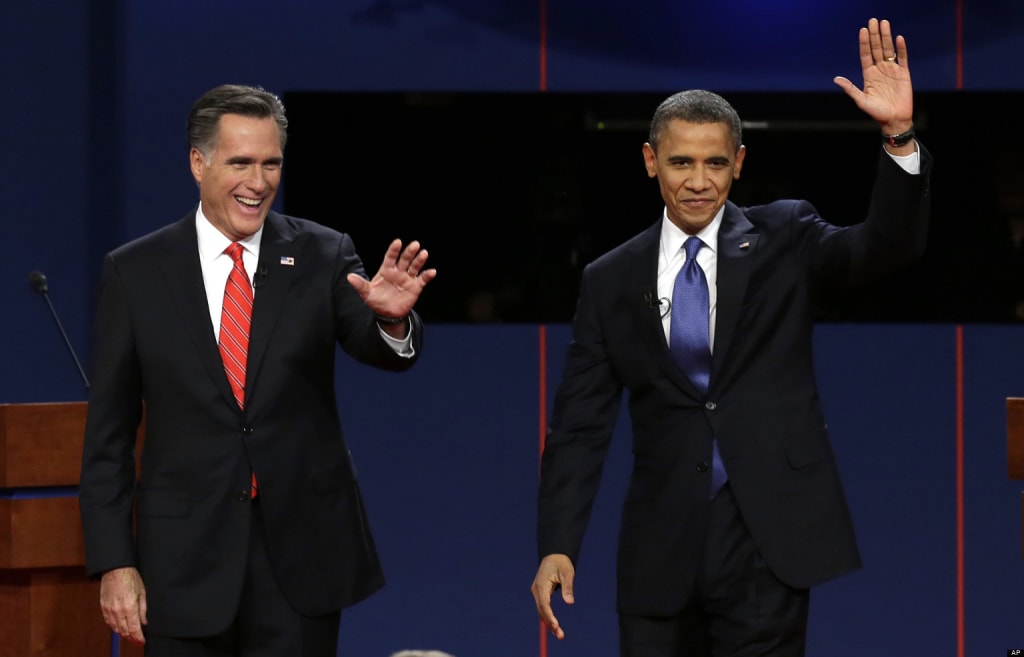
When it comes to the presidential elections, the debates are what really grab our attention. Of course, these debates show which candidate is more qualified to run the country. They'll reason, argue, and essentially debate over certain topics that revolve around the country; from the economy to immigration and policies. Since thousands and thousands of people are watching these debates, the candidates want to show that they're the potential president that the country needs.
And these presidential debates get pretty heated. The subjects become more challenging and one candidate would have the right things to say all while the other isn't meeting with their voters' expectations. Plus, they're really entertaining to watch and we get to understand more of the candidates' perspective on certain topics and situations. If you're curious which debates gained the most attention, these are the most famous presidential debates to this day.
Kennedy vs Nixon—1960

The Kennedy and Nixon debate was actually the first televised presidential debate in US history. Not to mention that it’s also the most consequential since it is mainly viewed as part of a crucial role in Democrat John F. Kennedy’s victory over Republican Vice President Richard Nixon during that year’s general election.
However, it was reported that Americans who listened to the debate on the radio believed that Nixon came off better. Yet, Kennedy’s calm and composed manner on television made him the winner compared to Nixon’s nervous disposition. Even though there wasn’t an actual poll on the difference between the two on the radio and television, the differences were certainly clear on the television.
Carter vs Ford—1976
Among the famous presidential debates of all time, the Carter and Ford debate in 1976 was the return of television debates, after the 16-year period where it was strictly on the radio. And the return of televised debates couldn’t be any more perfect for the arrival of the 1976 presidential debate. It was a face off between Democrat Jimmy Carter and Republican President Gerald Ford.
After maintaining a great lead throughout the majority of the general election, Ford started to really close in on Carter during the final weeks of the election. However, the president started to stumble over a question during their second debate revolving around Poland, where he insisted that it was not under “Soviet domination.” But then Ford had to retract his statement, thinking that he was over his head. In the end, he would lose to Carter that November.
Reagan vs Carter—1980
The Reagan and Carter debate is definitely among the famous presidential debates. The 1980 debate is remembered for Ronald Reagan’s victory, which was given credit to bringing up a conservative revolution in the country. However, the polls were tight and fluctuating when he and President Jimmy Carter came into their first and only televised debate late during the election season. Even though there was a ton of dissatisfaction with Carter, there was also deep concern with Reagan’s experience and temperament.
Not only did Reagan properly convince the American voters that he could be the potential president for the country, but he devastated Carter with a single one-liner, “There you go again,” and an FDR-inspired closing statement, “Are you better off now than you were four years ago?” This was from the embattled Democratic president that never assembled a memorable retort to. However, four years later, Reagan would demonstrate once again why it’s a mistake to underestimate “The Gipper.”
Reagan vs Mondale—1984
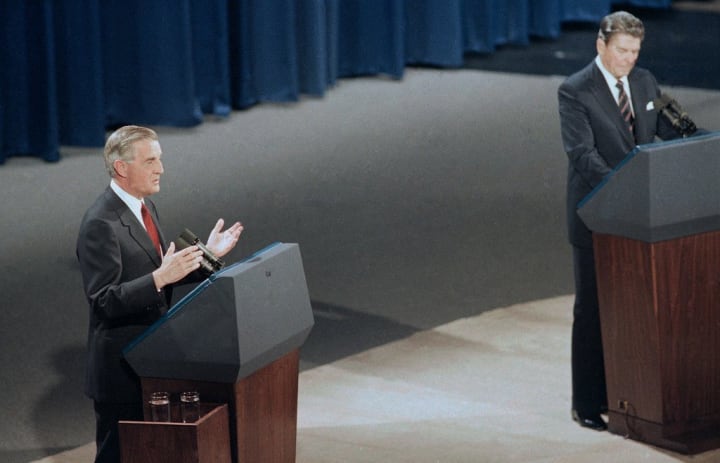
Even though Reagan has been a long-time favorite and won the re-election in November, his off performance in the first television debate opposite of Walter Mondale slightly gave the Minnesota Democrat and former Vice President a bigger boost in the polls. Reagan’s performance brought renewed focus on his advanced age (he was 73 during the time) and this raised questions on how engaged he was in the business of the White House.
On the pre-24 hour cable news atmosphere, Reagan had the ability to demolish the entire controversy with one simple joke, “I will not make age an issue of this campaign. I am not going to exploit, for political purposes, my opponent’s youth and inexperience.” At this point, since that one line was so great, Mondale couldn’t help himself but laugh. Then he would later concede that he was dying inside because, “I knew he had gotten me there.” However, in the second debate, Reagan would accidentally reveal the location of a CIA facility in Central America and give a closing statement so disoriented that the broadcast needed to be cut off prematurely. Yet, his energy in the campaign never once stalled, and he won in another huge landslide that fall.
Bush vs Dukakis—1988
Now comes the Bush and Dukakis debate, which is certainly seen to be among the most famous presidential debates ever. The beginning of the end of Michael Dukakis’ presidential run could actually be traced back, in part, to his performance in televised debates opposite then Vice President George H. W. Bush. His emotionless delivery completely turned off the majority of his voters—especially when he was asked an arguably “gotcha” question about whether he would actually stand by his anti-death penalty position if his wife were “raped and murdered.”
Throughout the years since, CNN's Bernard Shaw has actually stood by his provocative line of questioning. Dukakis has defended his response, “I have to tell you, and maybe I’m just still missing it… I didn’t think it was that bad,” is what he told PBS 16 years later. And this was certainly something that people wanted to hear from him for a very long time.
Quayle vs Bensten—1988
The only actual highlight of the election in 1988 for Democrats was when veteran Texas Senator Lloyd Bentsen faced off against the youthful Indiana Senator Dan Quayle. And during the debate, Quayle attempted to link himself to the legacy of former President John F. Kennedy and the comparison actually didn’t settle well with Bentsen. “I served with Jack Kennedy. I knew Jack Kennedy. Jack Kennedy was a friend of mine. Senator, you’re no Jack Kennedy,” Bentsen said, which immediately caused an applause.
Quayle then pushed back and a couple of pundits then and now believed the retort was way over the line, and voters noticed the truth in the statement. Even though Quayle is seen to be taking the winning ticket in November, his term as Vice President was sullied by the look that he was a gaffe-prone upstart. On the other hand, Bentsen proved that one “faithless” West Virginia elector pledged her support to him in the general election tally, yet not Dukakis, who won the state and technically all its delegates.
Bush vs Clinton vs Perot—1992
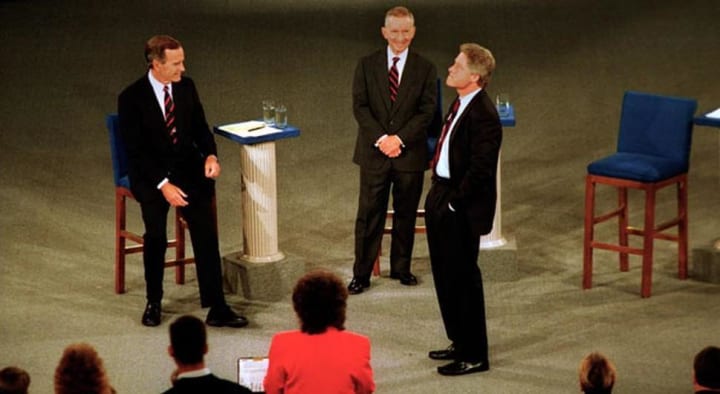
It’s likely unusual to have a third party candidate during a presidential debate, which makes the Bush, Clinton, and Perot debate an interesting one and among the most famous presidential debates. This one was where businessman Ross Perot ensured a great level of interest in the 1992 presidential debates. Not to mention that they were also the first to introduce the “town hall” format, which has become a staple of the modern debate series.
This format was actually recognized as favorable to then Arkansas Governor Bill Clinton, who became well-known for his intense eye contact and calmness with voters on the campaign trail. On the other hand, President George H. W. Bush was a lot more awkward in these encounters. And this shows with his seemingly testy reaction to a question about how the national debt and recession affected his life or even the lives of anyone close to him. Yet, what was even a bigger moment, was when the question was being asked, the president was caught on camera looking at his watch, which only aggravated the look that he was indifferent and disconnected from the concerns of the citizens of America.
Gore vs Bush—2000
Among the most famous presidential debates ever is the Gore and Bush presidential debate. The pundits may have argued that Vice President Gore topped George W. Bush on substance, but he faltered in terms of style. Firstly, his sighing during Bush’s answers was totally disrespectful. Then, his aggressiveness, mainly when he appeared to be ready to jump on Bush physically, was held against him. But then Bush had the ability to turn it all around.
However, this year it was also proved that the expectations game can actually be as crucial as debate preparation and the actual performance—aside from the face-to-face meetings. And Gore actually had a strong reputation as a tough debater. But still, Bush was contending with the appearance of being a smart individual even though many experts expected him to fail miserably. But in the end, Bush won and both major parties tried their best.
Palin vs Biden—2008
It’s seen that there may be no vice presidential debate before or since that's ever generated more attention, mainly because of Sarah Palin, the Alaskan Governor, who entered the stage following a series of very embarrassing headlines and terrible interviews. From those, it brought up real questions in voters’ minds about whether or not she would be a great fit for the office. Even Senator Joe Biden himself poorly received off-the-cuff remarks where he also had to tread lightly, because there was already a heightened sensitivity to sexism in the campaign.
In the end, the debate carried on without any major incidents. In fact, Palin made more than a few factual errors and largely pursued her talking points rather than answering the moderator’s. Yet, it didn’t undermine the Democrats’ energy or restore the trust in the GOP ticket.
Obama vs Romney—2012
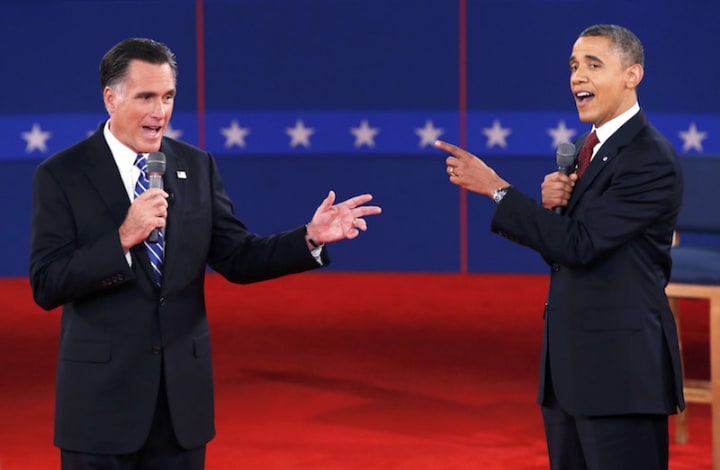
Lastly from the most famous presidential debates, is the Obama and Romney debate in 2012. This debate gained a lot of attention from the citizens, because it was a pretty heated debate. After a boring first debate, President Obama noticed his re-election chances in real peril while he headed into his second primetime debate, in a match with Republican Mitt Romney. In the midst of a back-and-forth conversation about the attack in Benghazi, Romney attempted to take Obama to task for allegedly not calling it a terrorist attack.
Then, Obama confidently pushed moderator Candy Crowley to “Get the transcript,” where she eventually interjected and confirmed that the president called the situation an “act of terror.” This was where viewers accused Crowley to be attacking Obama, and the moment exposed the vacuousness of Romney’s attack and played into the Democrats’ narrative that he was dishonest. Then, Obama easily went through the third and final debate, and essentially winning in November.
About the Creator
Glenn Bushinski
Poli Sci professor, closet protestor, and news addict. Definitely House Stark.


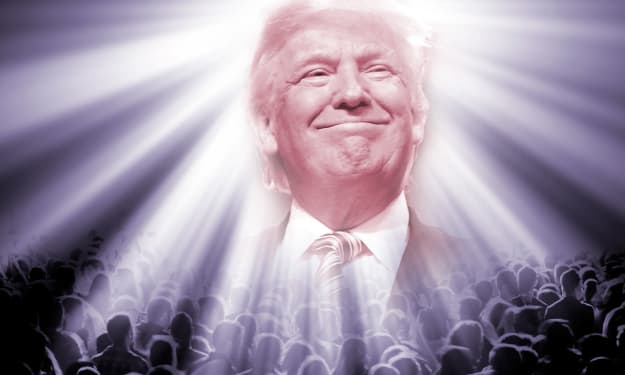



Comments
There are no comments for this story
Be the first to respond and start the conversation.